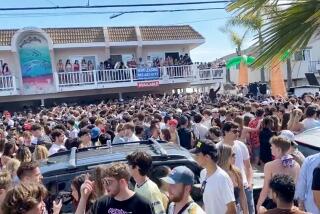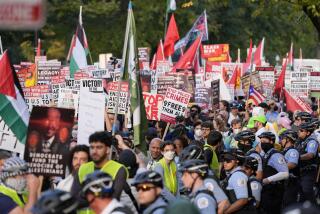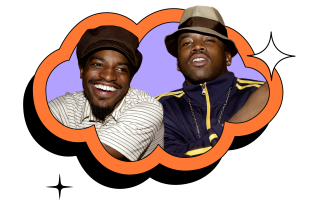‘Freaknik’ Revelers Descend on an Apprehensive Atlanta
- Share via
ATLANTA — With some community leaders predicting violence and the National Guard staging drills nearby, the annual spring bacchanal known as “Freaknik” got under way Friday, with waves of festive college students promenading down barricaded downtown streets.
Fearing the worst, many Atlantans have left town. Others stayed home from work, leaving downtown eerily deserted Friday morning. But by early afternoon, the party had begun.
The revelers cared little about the air of grim preparedness and tension that has gripped the city for weeks. “It was so good last year, I had to come back again to make sure I wasn’t dreaming,” said Terry Jackson, 25, of Hattiesburg, Miss.
This year--after last year’s record 200,000 participants caused massive traffic jams and chaos--the spring break gathering was awaited with all the dread and trepidation of the apocalypse.
“The city too busy to hate is gearing up for the confrontation of its life,” City Councilwoman Carolyn Long Banks said earlier this week. She and others voiced concern that the mayor’s plan to cordon off neighborhoods and crack down on unruly behavior might incite violence.
Concerned about “possible overreaction” by police, the American Civil Liberties Union is monitoring events. And veteran civil rights leader Hosea Williams sent a letter to U.S. Atty. Gen. Janet Reno asking for federal observers.
A number of church and student groups also are volunteering to help quell tensions, direct traffic and provide first aid.
Freaknik cost $300,000 in police overtime and added costs last year but reportedly added $20 million to the city’s economy. At the same time, however, it paralyzed much of Atlanta. Thoroughfares turned into parking lots as young people left their cars for spontaneous curbside parties. Revelers trashed parks and neighborhoods. And there were numerous reports of lewd behavior--”freaking,” after all, is a slang term for adventuresome sex. The police largely looked the other way.
Making matters worse this year, Freaknik overlaps with the city’s second-largest convention of the year, a computer trade show in which 85,000 people are expected to attend. Even if the worst-case scenario is avoided, the police--who officials stress have undergone sensitivity training--will be sorely tested in their efforts to keep the streets open.
“In these kind of circumstances you get criticism from people who think the mayor is not tough enough, and then from those who think he is too tough,” acknowledged Angelo Fuster, Mayor Bill Campbell’s spokesman. He insisted, though, that “the vast majority of people think he is doing what needs to be done and going about it the right way.”
*
Campbell began trying to discourage students from coming several months ago. Six Atlanta college presidents sent letters to the heads of 137 historically black colleges urging them to discourage students from attending. When it became apparent they were coming, Campbell revised his earlier comments, this time saying students were welcome as long as they obeyed the laws.
African American college students have gathered here during spring break for at least a decade. Problems started two years ago when 100,000 students showed up. When permits for concerts and other activities were denied at the last minute, students held impromptu parties in the street and cruised the streets in endless caravans. Twice as many students showed up last year.
City Councilman Michael Bond, 29, attended Freaknik as a student 10 years ago. “Freaknik, as I knew it, no longer exists,” he said. “What happens now is people converge on the city like an annual migration. . . . Freaknik has snowballed into an atrocity. I have no sympathy for the participants.”
Some are calling this year’s gathering “Freedomfest” in an effort to get away from the connotations of Freaknik. But rather than merely changing the name, some college students suggest overhauling the concept.
Kenya Ratcliff, a senior at Spelman College, said she planned to leave town for the weekend. “If there is going to be an event for black colleges, it should be something with a bit more positive agenda,” she said.
Complicating the city’s response is the issue of race. Atlanta’s population is nearly 70% African American. The mayor, police chief and many other officials are black. But many of the affected neighborhoods are predominantly white, leading to allegations that residents are opposed to it because of the students’ race.
But Paul Bradley, an attorney who heads an organization of business owners and residents who were affected last year, said civic leaders who are making a racial issue of it are acting irresponsibly.
He supports the mayor’s tough stance but said he fears what might happen if police clamp down hard, “especially if people are coming to the city with a chip on the shoulder, and feeling they are being disrespected just because they are black.”
More to Read
Sign up for Essential California
The most important California stories and recommendations in your inbox every morning.
You may occasionally receive promotional content from the Los Angeles Times.













